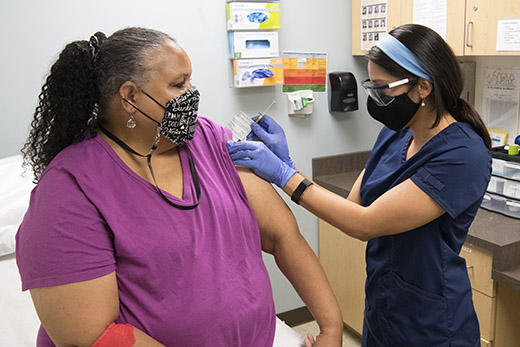
Caption
Many Georgians remain confused about whether they need to get a COVID-19 vaccine after having survived the disease, pitting natural immunity against vaccine technology.
Credit: Courtesy Emory University

Many Georgians remain confused about whether they need to get a COVID-19 vaccine after having survived the disease, pitting natural immunity against vaccine technology.
Many Georgians remain confused about whether they need to get a COVID-19 vaccine after having survived the disease, pitting natural immunity against vaccine technology.
The Centers for Disease Control and Prevention in August shared a study showing vaccination offers higher protection than previous COVID-19 Infection.
The agency also shared data indicating unvaccinated people are more than twice as likely to be reinfected with COVID-19 than those who were fully vaccinated after initially contracting the virus.
But a month later, community leaders and members were sharing misinformation — that is, inaccurate information spread without malice.
Floyd County Coroner Gene Proctor said he heard the opposite of what the CDC reported in August.
“If you've had COVID, you're basically carrying 27 times the antibodies than you would from a vaccine,” he said. “So natural immunity is actually better than the vaccine immunity.”
When asked where he heard the 27 times statistic, Proctor attributed the CDC.
Proctor further shared his understanding of how the mRNA technology works, saying the available COVID vaccines are "not true vaccines in the sense we know vaccines."
“It's a bot, and the bot is designed to make your body think that something's there and build antibodies and go against it,” Proctor said. “Before they would use actual viruses and things and develop those to make your body, recognize them and fight against them. So, a little bit different technology.”
MORE: How misinformation about vaccines is killing Georgians
Some people simply don’t know who to trust or why the science keeps changing.
Louis Borja of Cherokee County said he believes he has immunity from COVID because he was previously infected.
About a week before the CDC released its latest study on vaccine immunity, associate professor of infectious diseases at Emory University School of Medicine Dr. Jay Varkey said unvaccinated individuals are five times more likely to get infected than someone who was vaccinated against COVID-19.
“Our immune systems are much more complex and robust than a simple measure of antibodies,” Dr. Jay Varkey
The most recent data available to the CDC show both infection-induced and vaccine-induced immunity are durable for at least six months — but that vaccines are more consistent in their protection and offer a huge boost in antibodies for people previously infected.
Immunity after vaccination evolves over time, which is normal as antibodies decrease over time with other infections.
“Our immune systems are much more complex and robust than a simple measure of antibodies,” Varkey said. “One way I like to think about it is that if we had antibodies to every infection we get exposed to, our blood would (have a) high-viscosity, sludgy solution because it'd be full of immune cells.”
As we humans have evolved, we decrease our antibodies and we focus more on memory cells that protect us from dying, Varkey said.
When germs, such as the virus that causes COVID-19, invade our bodies, they attack and multiply, causing infection and illness. The immune system’s T-lymphocytes fight infection by attacking infected cells in the body.
Both Moderna and Pfizer-BioNtech are mRNA vaccines that contain material from the SARS-CoV-2 virus that causes COVID-19. The material in the vaccine gives cells instructions for how to make a harmless protein that is unique to the virus.
After the person heals, the body keeps some of these white blood cells as “memory cells” to react quickly when faced with the same virus. The body also retains B-lymphocytes, which are defensive white blood cells that produce antibodies.
“Something that we've been exposed to — that is adaptive immunity,” Varkey said. “That's the mature immunity.”
Our bodies recognize that the protein should not be there and build T-lymphocytes and B-lymphocytes that will remember how to fight the virus that causes COVID-19 if we are infected in the future.